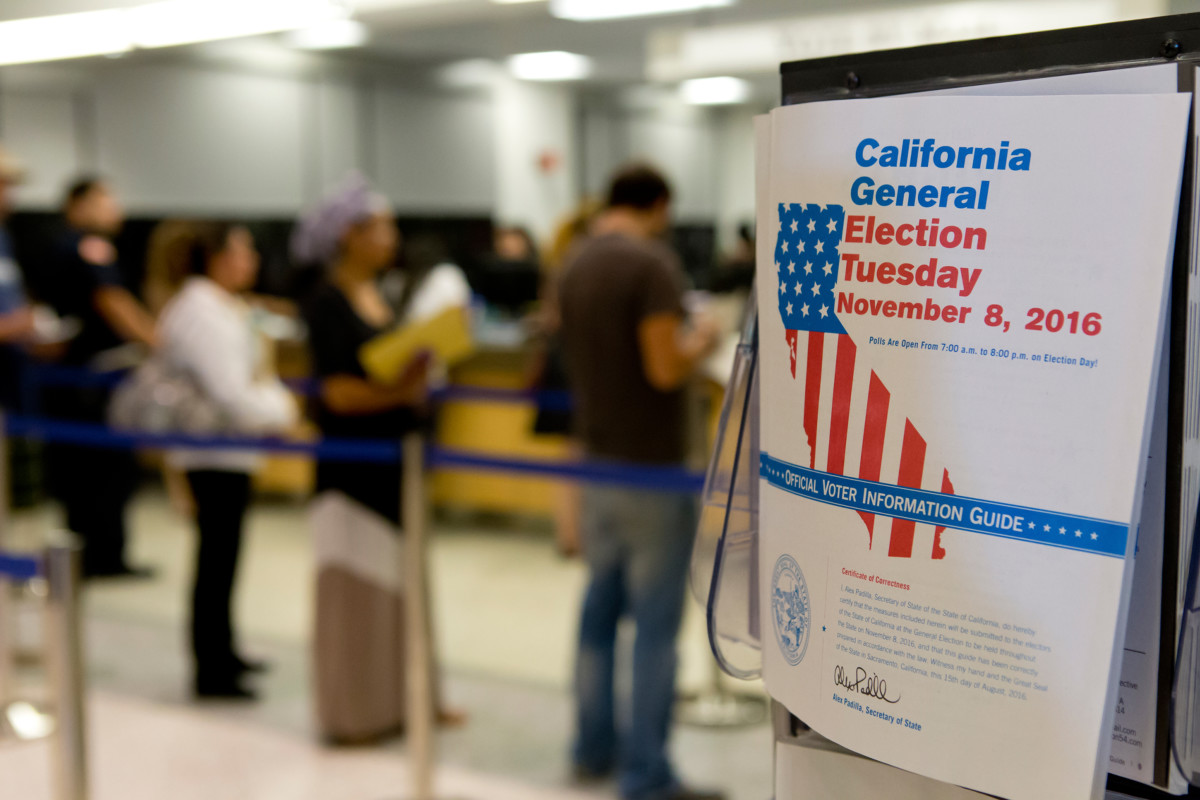California’s top-two primary system — technically known as an open blanket primary — is attracting national attention, thanks to fears that it could disadvantage Democrats in several House races in Southern California. And with Democrats keen on retaking the House, anything that might affect the margin of victory is cause for concern among progressive voters.
For California voters in the affected districts, it’s important to understand what’s at stake so they can vote strategically and encourage their family, friends and coworkers to do the same. For everyone else, it’s a lesson in unintended consequences.
In an open blanket primary, all candidates for a given race — such as a House seat — are listed together on the ballot, allowing voters of all political parties to vote for whoever they prefer. The top two vote-getters advance to the general election. In addition to California, Washington state and Nebraska also use this system.
Proponents say the top-two system allows voters to select the candidates they feel best represent them. But in a big field, it can result in a split vote that causes some unexpected consequences. For example, in 2016, the blanket primary system allowed two Democratic Senate candidates – Kamala Harris and Loretta Sanchez — to face off in the general election, effectively locking Republicans out.
This can be a problem when the ballot includes just a few people from one party, and a lot of candidates from another. Voters tend to stick to party lines, so their votes may splinter, making it impossible for any one candidate to get enough votes to claim second place. And some commentators claim that’s precisely the issue in California, where an optimistic “blue wave” has led large numbers of Democrats to file for candidacy — and left voters with a long list of potential options.
There’s another issue for progressive voters: One of the ballot measures before voters in November is a repeal of the gas tax, something wildly popular among Republicans. GOP voters came out in droves for a signature campaign for repeal, and several candidates are using the gas tax for leverage in their campaigns. Mobilized conservative voters could end up playing a big role in the primary — especially in the wealthy Southern California districts that some Democratic upstarts were hoping to flip, like the 39th, 48th and 49th.
In response to these worries, the Democratic party has been pushing some candidates to drop out, and banking on more moderate candidates to appeal both to Democratic voters and conservatives who may be on the fence. They’re also campaigning heavily on an anti-Trump platform, appealing to people of all political parties who are unhappy with the Trump administration. But this strategy has exposed Democrats to criticism — some feel it’s unfair to push candidates to drop out, or to assume that more leftist candidates can’t thrive in the election. And with ballots already printed and mailed, some voters may not be aware that candidates have dropped out.
A similar situation may arise with the attorney general race, warns the San Diego Union-Tribune, with the two Democratic candidates — including incumbent Xavier Becerra — locked into a vicious fight that could split votes enough to allow the Republican candidates to snag the top two spots. In the governor’s race, the tables have turned, with Republicans fearing that they won’t get enough votes to land second place — Democratic Lieutenant Governor Gavin Newsom is handily in the lead.
Meanwhile, attempting to game the system costs a lot of money, which cuts out politicians who lack fundraising clout or independent wealth — as well as those who want to be choosy about who they accept donations from in the interests of integrity. Newsom, for example, declined to adhere to California’s voluntary spending limit for state races, freeing himself up to accept — and use — more money in his campaign.
California could get around these issues with an instant runoff system, which would allow voters to pick their favorite candidate and then rank the others by preference — though such systems come with their own risks. In the meantime, both political parties are pushing for an end to the top-two system, fearing more lock-outs on general election ballots.
California voters should keep a close eye on polling data if they live in flippable districts, and take these factors into account when deciding which candidates to support and considering whether they need to cast a strategic vote to prevent a splintering field. Voters may also wish to encourage the people around them to do the same. While it doesn’t necessarily feel great to vote for a candidate that doesn’t thrill you, splitting the field and allowing two candidates of an opposing party to move on to the general election isn’t an encouraging alternative.
4 Days Left: All gifts to Truthout now matched!
From now until the end of the year, all donations to Truthout will be matched dollar for dollar up to $44,000! Thanks to a generous supporter, your one-time gift today will be matched immediately. As well, your monthly donation will be matched for the whole first year, doubling your impact.
We have just 4 days left to raise $44,000 and receive the full match.
This matching gift comes at a critical time. As Trump attempts to silence dissenting voices and oppositional nonprofits, reader support is our best defense against the right-wing agenda.
Help Truthout confront Trump’s fascism in 2026, and have your donation matched now!
